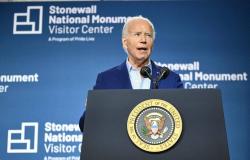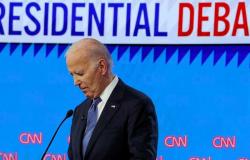
The MR became the leading political party on the French-speaking side while in Flanders, the N-VA remained in the lead. Even if Vlaams Belang is making progress, the expected far-right tidal wave has not taken place.
The Liberals in fact snatched the position of leading party from the PS, with 29.59% of the votes, while 99.85% of the offices were stripped. A score which jumped by 8.17 percentage points (pp) compared to the 2019 elections, according to the results published by the FPS Interior. “A historic moment,” rejoiced their president Georges-Louis Bouchez, recalling that a victory implies responsibilities. “We have a duty to implement our program, to create the coalition which will make it possible to make the reforms that the people of Brussels and the Walloons are asking of us,” he declared.
Behind, the PS lost 2.94 pp to 23.22%. However, it retains its strongholds of Liège, Mons and Charleroi. In his speech at the party headquarters, the president of the Socialists Paul Magnette recognized “a trend towards erosion of results”. In third position, Les Engagés made a real breakthrough by gaining 9.67 pp to reach 20.67% of the votes. Just like the socialists, the PTB is also losing weight but is limiting the damage. The far left lost 1.58 pp to 12.10%. Finally, Ecolo showed a clear underperformance by seeing half of his votes disappear. The Greens fell by 7.51 pp, to 6.97% of the vote.
In terms of seats, the MR obtains 26, up 6 units, while the PS loses 4 and stops at 19. The Engagés obtain 17, the PTB 8 (-2) and Ecolo 5 (-7). A coalition between the liberals and the centrists – favored by the MR – would thus have a majority in the Walloon parliament, with 43 seats out of 75. Shortly after 2:00 a.m. Monday morning, the socialist Christie Morreale was the champion of preference votes with 29,768 votes . Followed by Thomas Dermine (PS) with 22,595 votes and Willy Borsus (22,574). In percentage terms, it was the liberal who won, with 13.51% of the votes in his favor.
Alexander De Croo: “As of tomorrow, I will be a resigning Prime Minister”
The N-VA, on the other side of the linguistic border, is the big winner
The N-VA party certainly lost a seat in the Chamber but remained in first place, well beyond what the polls predicted. And if Vlaams Belang progresses, it fails to take first place. The specter of a breakdown of the cordon santé around the far-right is receding.
Unlike Brussels and Wallonia, the left found some color in Flanders with the progress of Vooruit and the PTB-PvdA tempered by the losses of Groen, although in lesser proportions than its French-speaking brother. The big loser is undoubtedly the Open Vld. In October 2020, in the midst of a health crisis, its leader, Alexander De Croo, received the post of Prime Minister and took the head of a Vivaldi coalition with seven parties and without a majority in Flanders. Three and a half years later, at the end of a campaign focused on him, his political party experienced a historic defeat which has already caused the resignation of President Tom Ongena.
Emmanuel Macron announces the dissolution of the National Assembly
What about Brussels?
The MR is confirmed as the first party in the Brussels Parliament, according to the provisional results of the FPS Interior Monday at 2:00 a.m. after the counting of 713 offices out of 728. The French-speaking liberals (26.09%), thanks to a sharp increase compared to 2019 , are well ahead of the PS (21.94%), which almost equals its score of five years previously, and the PTB (20.79%), also in strong progress.
The MR should thus offer itself 20 seats in the hemicycle of the capital according to a provisional projection, ahead of the PS (16) and the PTB (15). He is preparing to open negotiations with a view to establishing a regional majority, a first for the French-speaking liberals since 1999.
In the French-speaking linguistic group, Les Engagés recovered its head with 10.7%, progressing by more than three points in five years. The centrist party should thus garner 8 seats (6 in 2019; 4 at the end of the past legislature). This suggests, as at other levels of power, an active role in the opening of negotiations for a majority, promised, at least initially to a trio including the PS.
The big losers of the vote are Ecolo (9.88%), which would go from 15 to 7 seats, while DéFI (8.16%) would lose four seats, going from 10 to 6 elected officials. For DéFI, the prospects for prolonged participation in negotiations are low, after ten years of presence in the Brussels government. Ditto for Ecolo, with however a slight downside at the Brussels level: the strong links with Groen, which handily won the vote in the Dutch-speaking linguistic group, in first place acquired in 2019 and strengthened by 2.2% with more than 22% of the votes, which consolidates its four seats.
European elections 2024: Sophie Wilmès breaks the record for French-speaking votes
Highlight of Groen’s result: it is the party which supported the Good Move traffic plan contested by the liberals and French-speaking socialists during the campaign. The Dutch-speaking surprise of the Brussels vote came from the “Team Fouad Ahidar” list, named after a former Vooruit MP, who gleaned more than 16% of the votes, coming second. The start of discussions with this new formation seems difficult to avoid, to the extent that other scenarios are hardly, if ever, possible with fewer than four partners. The traditional parties, on the other hand, are in decline: the N-VA, which hoped to win, fell to 12% (- 6 points) and went from three to two seats. Ditto for the Open VLD which obtained 10.71% (- 5 points). The CD&V fell to 6.36% (-1.1 points), but retains one elected official in the capital region’s hemicycle. On the other hand, Vlaams Belang progressed slightly to 10.6% (+ 2.2 points) and gained an additional elected official (two in total).
Towards which coalitions?
In Brussels, even if it overtakes the PS, the MR will not be able to do without the socialists to form a majority… and the mayor of Brussels, Philippe Close, has already pointed out that, in the capital, left-wing parties were not far from 50%. In Wallonia, an MR-Engagés coalition cannot be ruled out. The PS would find itself in opposition, as during the brief period of the Borsus government between 2017 and 2019.
In Flanders, the president of the N-VA, Bart De Wever, also has the hand. In view of the defeat of the liberals and the looming opposition cure, the “Swedish” will not be renewed. On the other hand, a rise in Vooruit is very likely.
At the federal level, it is up to the King to appoint mission leaders, in principle an informant, after hearing the party presidents. Several coalition avenues are possible. The equation must also take into account one parameter: Mr. De Wever has clearly announced his desire to give more autonomy to Flanders. A prospect which involves finding a two-thirds majority… A real headache in the current state of things.





